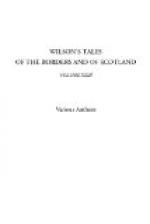I cannot say so much for the authenticity of the legend I am now to relate, as I have been able to do for some of the others in this collection; but that is no reason, I hope, for its failing to interest the reader, who makes it a necessary condition of his acceptance, that a legend shall keep within the bounds of human nature: not that any one of us can say what these bounds are, for every day of our experience is extending them in both the inner and outer worlds; and we never can be very sure whether the things which rise upon the distant horizon of our nocturnal visions are less unstable and uncertain than those that exist under our noses. True it is, at any rate, that the legend was narrated to me in a meagre form by a lady, sufficiently ancient to be supposed to be a lover of strange stories, and not imaginative or wicked enough to concoct them.
That part of Edinburgh called the West Bow was, at the date of our legend, the tinsmiths’ quarter; a fact which no one who chanced to walk down that way could have doubted, unless indeed he was deaf. Among the fraternity there was one destined to live in annals even with more posthumous notoriety than he of the same place and craft, who long got the credit of being the author of the “Land o’ the Leal.” His name was Thomas, or, according to the Scottish way of pronouncing it, Tammas Dodds; who, with a wife going under the domestic euphuism of Jenny, occupied as a dwelling-house a small flat of three rooms, in the near neighbourhood of his workshop. This couple had lived together five years, without having any children procreated of their bodies, or any quarrel born of their spirits; and thus they might have lived to the end of their lives, if a malign influence, born of the devil, had not got possession of the husband’s heart.
This influence, which we may be permitted by good Calvinists to call diabolical, was, as a consequence, not only in its origin, but also in its medium, altogether extraneous to our couple. For so far as regards Mrs. Jenny Dodds, she was, as much as a good wife could be, free from any great defects of conduct; and as for the tinsmith himself, he had hitherto lived so sober and douce a life, that we cannot avoid the notion, that if he had not been subject to “aiblins a great temptation,” he would not have become the victim of the arch-enemy. Thus much we say of the dispositions of the two parties; and were it not that certain peculiarities belonged to Jenny, which, as reappearing in an after-part of our story, it is necessary to know, we would not have gone further into mere character—an element which has little to do generally with legends, except in so far as it either produces the incidents, or may be developed through them. The first of these peculiarities was a settled conviction that she had as good a right to rule Tammas Dodds, as being her property, as if she had drunk of the waters of St. Kevin. Nor was this conviction merely natural to her; for she




